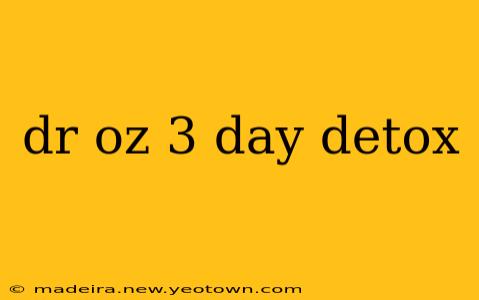Dr. Oz's 3-Day Detox: A Critical Look at the Claims and Reality
The allure of a quick fix is powerful, and the idea of a rapid detox, especially one endorsed by a prominent figure like Dr. Oz, can be incredibly tempting. But before you embark on any drastic cleansing program, particularly one promising dramatic results in just three days, it's crucial to separate fact from fiction and understand the potential implications. This article will delve into the purported Dr. Oz 3-Day Detox, examining its claims, the scientific basis (or lack thereof), and offering a balanced perspective on healthy detoxification.
What is the supposed Dr. Oz 3-Day Detox?
It's important to note upfront that Dr. Oz hasn't explicitly endorsed a single, definitive "3-day detox." Rather, over the years, his show has featured various segments promoting short-term cleansing plans that often emphasize increased fruit and vegetable consumption, reduced processed foods, and increased water intake. These plans often include specific recipes and recommendations, but they are not a standardized, single program. The essence of these plans is to give the body a temporary "break" from what are perceived as harmful substances.
Does a 3-Day Detox Actually Work?
This is where the critical lens becomes essential. While increasing your intake of fruits, vegetables, and water is undeniably beneficial for overall health, the idea of a rapid, three-day detox eliminating toxins from your body is largely unsubstantiated. Your liver and kidneys are your body's natural detox organs, continuously working to filter out waste products. A three-day cleanse won't magically improve their function beyond their inherent capabilities.
What are the claimed benefits of a 3-day detox?
Many proponents of short-term detoxes claim a variety of benefits, including:
- Weight loss: While temporary weight loss may occur due to fluid loss, this is not sustainable or healthy.
- Increased energy: Improved energy is more likely due to increased hydration and nutrient intake from increased fruit and vegetable consumption rather than any special detox effect.
- Improved skin: Similar to energy, improved skin tone could result from improved hydration and nutrient-rich foods.
- Better digestion: Increased fiber intake from fruits and vegetables can improve digestion.
It’s crucial to remember that these benefits are achievable through long-term healthy lifestyle changes, not a short-term detox.
What are the potential risks of a 3-Day Detox?
While a short-term plan focusing on healthy foods generally poses minimal risks for healthy individuals, several potential drawbacks exist:
- Nutrient deficiencies: Restrictive diets can lead to nutrient deficiencies if not carefully planned.
- Electrolyte imbalances: Some detoxes promote excessive fluid loss, potentially leading to dangerous electrolyte imbalances.
- Headaches and fatigue: Sudden dietary changes can cause headaches and fatigue.
- Unsustainable lifestyle: Detoxes can create an unhealthy cycle of restriction and indulgence.
Are there natural ways to support detoxification?
Yes, consistently focusing on a healthy lifestyle is the best way to support your body's natural detoxification processes. This includes:
- Drinking plenty of water: Hydration is key for optimal kidney function.
- Eating a balanced diet: Focus on whole, unprocessed foods rich in fruits, vegetables, and fiber.
- Regular exercise: Physical activity supports overall health and metabolic function.
- Getting enough sleep: Adequate sleep is crucial for cellular repair and detoxification.
What are the alternatives to a 3-day detox?
Instead of a restrictive 3-day detox, focus on gradual, sustainable lifestyle changes. These are far more effective in the long run for improving overall health and well-being.
Conclusion:
While the idea of a quick fix is appealing, the purported Dr. Oz 3-day detox, like many other similar programs, lacks robust scientific backing for its dramatic claims. Instead of chasing quick results, prioritize long-term healthy habits to support your body's natural detoxification processes and overall well-being. Consult your doctor or a registered dietitian before making any significant changes to your diet or lifestyle. They can provide personalized guidance based on your individual needs and health status.

